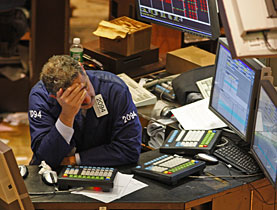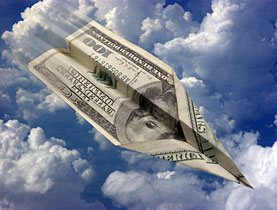Business upbeat despite US recession threat

Swiss companies remain positive about economic conditions despite growing rumblings that the United States may be on the verge of recession.
World share prices plummeted on Tuesday after the US Citigroup bank wrote off $18 billion (SFr19.6 billion) following the collapsed US subprime mortgage industry. There are fears the crisis could become widespread.
The biggest Swiss casualty of US economic woes so far is Switzerland’s largest bank, UBS, which is turning to foreign investors to plug a SFr13 billion ($11.9 billion) hole in its balance sheet.
The US is Switzerland’s second-largest trading partner after the European Union and remains the world’s most influential economy. A recession over the Atlantic would be bound to have far-reaching negative consequences around the globe.
Despite the warning signs, sentiment among 4,100 Swiss companies surveyed by UBS at the end of last year remained positive for 2008.
“Companies of all sizes and from all regions forecast higher sales and earnings overall, and the generally positive view is clouded only a little by fears of a slight weakening in certain sectors,” the report said.
This short-term confidence is well placed, according to Daniel Kalt, head of economic and Swiss research at UBS.
Wary eye
“All the conditions that led to high growth in the past few years remain in place. The weak Swiss franc supports exports, employment is rising and real disposable income is getting higher. The picture looks better than the news we’ve been hammered with from the financial markets,” he told swissinfo.
Hans-Ulrich Bigler, chief executive of the manufacturing sector’s umbrella body Swissmem, said the industry is well placed at the moment, but is keeping a wary eye on the uncertain medium-term prospects.
“We are not worried by our daily business because orders in the US are very good, capacity is running at 93 per cent and the industry is doing as well as it has been in the past 15 years,” he told swissinfo.
“But one of the reasons there has been so much growth in the Far East is because the US economy has being doing so well. Now we are seeing some major problems and we are worried that a damaged US economy could downsize the world economy in the next two to three years.”
Weak dollar
Martin Naville, head of the Swiss-American chamber of commerce, believes that thriving Swiss companies are currently well placed to weather an economic downturn but not a full-scale recession.
The major threat to their continued success lies in the weakening dollar that would damage exports and hit profits despite the advantage of offsetting rising oil prices, he added. The greenback hit an all-time low against the Swiss franc on Wednesday, with $1 being traded at SFr1.0839.
“The Swiss economy is export driven and these contracts are almost all in dollars – so a low dollar rate equals lower profits. A weak dollar is great for the airline business and importers, but Switzerland has a huge trade surplus and that could hurt companies,” Naville told swissinfo.
In December the State Secretariat for Economic Affairs (Seco) said the Swiss economy grew by 2.8 per cent in 2007 and would grow by 1.9 per cent in 2008.
swissinfo, Matthew Allen in Zurich
The United States is Switzerland’s most important trade partner after the European Union.
Exports totalled SFr20.48 billion ($18.75 billion) in 2006 – up 16.9% on the previous year.
Imports from the US carried a value of SFr10.95 billion ($10 billion) – up 31.5%.
This means that Switzerland had a trade surplus of SFr9.53 billion ($8.73 billion) with the US in 2006.
Exports to the US are three times higher than in 1990.
The US economy started to show cracks in late 2006 when the subprime mortgage industry – the lending of mortgages to people on low incomes – started to unravel.
The high rate of defaults first hit the financial industry that traded in mortgage-backed securities and then slowed the entire US housing market last year.
The world’s stock markets reacted negatively to the news, fluctuating wildly. National banks responded by pumping more money into the system in an attempt to stave off a credit crisis.
Problems continued in the US with the publication of disappointing December labour market figures that showed employment was not rising as much as was hoped.
The US Federal Reserve hinted this month that it may cut interest rates, but fears remain that high oil prices may still push up inflation. All eyes are now on the US consumer and the performance of other credit sectors, such as credit cards.

In compliance with the JTI standards
More: SWI swissinfo.ch certified by the Journalism Trust Initiative




You can find an overview of ongoing debates with our journalists here. Please join us!
If you want to start a conversation about a topic raised in this article or want to report factual errors, email us at english@swissinfo.ch.